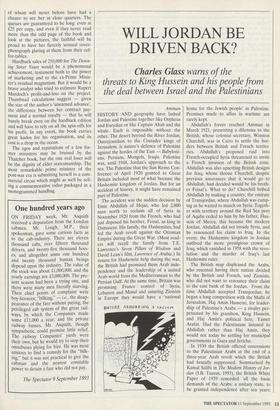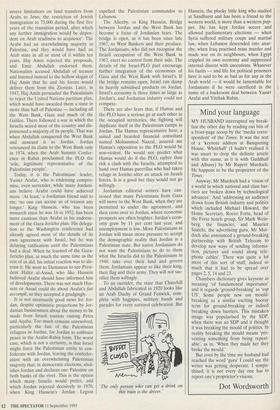WILL JORDAN BE DRIVEN BACK?
threats to King Hussein and his people from the deal between Israel and the Palestinians
Amman HISTORY AND geography have lashed Jordan and Palestine together like Orpheus and Eurydice or like Captain Ahab and the whale. Each is impossible without the other. The desert beyond the River Jordan, Outrejourdain to the Crusader kings of Jerusalem, is nature's defence of Palestine against the hordes of the East — Babyloni- ans, Persians, Mongols, Iraqis. Palestine was, until 1948, Jordan's approach to the sea. The Palestine that the San Remo Con- ference of April 1920 granted to Great Britain included most of what became the Hashemite kingdom of Jordan. But for an accident of history, it might have remained part of Palestine. The accident was the sudden decision by Emir Abdullah of Hejaz, who led 2,000 men north to reclaim all of Syria in November 1920 from the French, who had just deposed his brother, Feisal, as king in Damascus. His family, the Hashemites, had led the Arab revolt against the Ottoman Empire during the Great War. (Most read- ers will recall the family from T.E. Lawrence's Seven Pillars of Wisdom and David Lean's film, Lawrence of Arabia.) In return for Hashemite help during the war, the British had promised them Arab inde- pendence and the leadership of a united Arab world from the Mediterranean to the Persian Gulf. At the same time, Britain was promising France control of Syria, Lebanon and Mosul and assuring Zionists in Europe they would have a 'national
home for the Jewish people' in Palestine. Promises made to allies in wartime are rarely kept.
Abdullah's forces reached Amman in March 1921, presenting a dilemma to the British, whose colonial secretary, Winston Churchill, was in Cairo to settle the bor- ders between British and French territo- ries. Abdullah's proposed raid into French-occupied Syria threatened to invite a French invasion of the British zone. Abdullah was also upsetting British designs for Iraq, whose throne Churchill, despite previous assurances that it would go to Abdullah, had decided would be his broth- er Feisal's. What to do? Churchill bribed Abdullah by making a country, the emirate of Transjordan, where Abdullah was camp- ing as he waited to march on Syria. Togeth- er with territory around the Red Sea port of Aqaba ceded to him by his father, Hus- sein of Mecca, this became the modern Jordan. Abdullah did not invade Syria, and he renounced his claim to Iraq. In the event, the Hashemite kingdom in Jordan outlived the more prestigious crown of Iraq, which vanished in 1958 with the revo- lution and the murder of Iraq's last Hashemite ruler.
The British map displeased the Arabs, who resented having their nation divided by the British and French, and Zionists, who did not want to renounce their claim to the east bank of the Jordan. From the time Abdullah accepted Transjordan, he began a long competition with the Mufti of Jerusalem, Haj Amin Husseini, for leader- ship of Palestine's Arabs — a rivalry per- petuated by his grandson, King Hussein, and Haj Amin's political heir, Yasser Arafat. Had the Palestinians listened to Abdullah rather than Haj Amin, they would not today be settling for municipal governments in Gaza and Jericho.
In 1939 the British offered concessions to the Palestinian Arabs at the end of a three-year Arab revolt which the British had brutally suppressed. Summarised by Kamal Salibi in The Modern History of Jor- dan (I.B. Taurus, 1993), the British White Paper of 1939 conceded 'all the basic demands of the Arabs: a unitary state, to be granted independence after ten years;
severe limitations on land transfers from Arabs to Jews; the restriction of Jewish immigration to 75,000 during the first five years of the transition period, after which any further immigration would be depen- dent on Arab readiness to acquiesce'. The Arabs had an overwhelming majority in Palestine, and they would have had an Arab state in all or most of it within ten years. Haj Amin rejected the proposals, and Emir Abdullah endorsed them. Nationalists accused Abdullah of treason and listened instead to the hollow slogan of Haj Amin that he and his forces would deliver them from the Zionists. Later, in 1947, Haj Amin persuaded the Palestinians to reject the United Nations partition plan, which would have awarded them a state in more than half of Palestine — including all the West Bank, Gaza and much of the Galilee. There followed a war in which the Israelis seized most of the country and dis- possessed a majority of its people. That was when Abdullah conquered the West Bank and annexed it to Jordan. Jordan renounced its claim to the West Bank only in 1974, when the Arab Summit Confer- ence in Rabat proclaimed the PLO the `sole, legitimate representative of the Palestinian people'.
Today, it is the Palestinians' leader, Yasser Arafat, who is endorsing compro- mise, even surrender, while many Jordani- ans believe Arafat could have achieved more. 'At least,' a Jordanian friend said to me, 'no one can accuse us of treason any longer.' King Hussein, who has been monarch since he was 16 in 1952, has been more cautious than Arafat in his endorse- ment of the Gaza-Jericho plan. His delega- tion to the Washington conference had already agreed most of the details of its own agreement with Israel, but he was delaying ratification until the Palestinians had a deal. When he learned of the Gaza- Jericho plan, at much the same time as the rest of us did, his initial reaction was to dis- trust it. He went to Damascus to see Presi- dent Hafez al-Assad, who like Hussein believed Arafat should have informed him of developments. There was not much Hus- sein or Assad could do about Arafat's fait accompli, so they accepted it grudgingly.
It is not necessarily good news for Jor- dan, despite optimistic projections by Jor- danian businessmen about the money to be made from Israeli tourists visiting Petra and Aqaba. Too much remains unresolved, particularly the fate of the Palestinian refugees in Jordan, for Jordan to embrace peace in the Arafat-Rabin form. The worst case, which is not a certainty, is that Israel might force the Palestinian entity to con- federate with Jordan, leaving the confeder- ation with an overwhelming Palestinian majority that, in democratic elections, abol- ishes Jordan and.declares one Palestine on both banks of the river. This is the option which many Israelis would prefer, and which Jordan rejected decisively in 1970, when King Hussein's Jordan Legion expelled the Palestinian commandos to Lebanon.
The Allenby, or King Hussein, Bridge between Jordan and the West Bank has become a focus of Jordanian fears. The bridge is open, as it has been since late 1967, to West Bankers and their produce. The Jordanians, who did not recognise the Israeli occupation of the West Bank in 1967, exert no control from their side. The details of the Israel-PLO pact encourage further integration of the economies of Gaza and the West Bank with Israel's. If the bridge remains open, Israel can dump its heavily subsidised products on Jordan. Israel's economy is three times as large as Jordan's, and Jordanian industry could not compete.
There are also fears that, if Hamas and the PLO have a serious go at each other in the occupied territories, the fighting will duplicate itself in the Palestinian camps in Jordan. The Hamas representative here, a suited and bearded financial consultant named Mohammed Nazzal, assured me Hamas's opposition to the PLO would be non-violent. He would not predict what Hamas would do if the PLO, rather than risk a clash with the Israelis, attempted to hand over Hamas guerrillas who had taken refuge in Jericho after an attack on Israeli forces. It is a good bet they would not go willingly.
Jordanian editorial writers have cau- tioned that many Palestinians from Gaza will move to the West Bank, when they are permitted to under the agreement, and then cross over to Jordan, where economic prospects are often brighter. Jordan's econ- omy grew by 11 per cent last year, and unemployment is low. More Palestinians in Jordan will mean more pressure to accept the demographic reality that Jordan is a Palestinian state. But native Jordanians do not want the Palestinians to do to them what the Israelis did to the Palestinians in 1948: take over their land and govern them. Jordanians appear to like their king, their flag and their army. They will not sac- rifice them willingly. To an outsider, the state that Churchill and Abdullah fabricated in 1920 looks like an Arab Duchy of Grand Fenwick, com- plete with bagpipes, military bands and parades for every national celebration. But `The only person who can get a drink on this train is the driver.' Hussein, the plucky little king who studied at Sandhurst and has been a friend to the western world, is more than a western pup- pet. He has kept Jordan secure and allowed parliamentary elections — when Syria suffered military coups and martial law, when Lebanon descended into anar- chy, when Iraq practised mass murder and made war on its neighbours, when Egypt crippled its own economy and suppressed internal dissent with executions. Whatever his faults — and life for political prisoners here is said to be as bad as for any in the Arab world — it would be lamentable for Jordanians if he were sacrificed in the name of a backroom deal between Yasser Arafat and Yitzhak Rabin.



















































 Previous page
Previous page